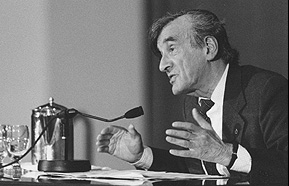![]()
Departments
![]()

|
Week of 16 October 1998 |
Vol. II, No. 10 |
Feature
Article
"Seized by history"
Memory is theme of symposium as students and colleagues honor Wiesel
Elie Wiesel, the 1986 Nobel Peace Prize laureate who has gone face-to-face with leaders all over the world over issues of human rights, is a little diffident about facing a symposium at Boston University later this month. That's because the symposium is in his honor, and tributes tend to embarrass him. He of course will participate, he says, and he is grateful for the honor, "but I am above all a teacher."
|
|
|
"But I am above all a
teacher." Elie Wiesel discussing Talmudic legends
last year at one of his three annual Encounters at
Boston University. His public appearances at
Metcalf Hall always attract hundreds of members of
the public, ad hoc students of the full-time
teacher. Photo by Kalman
Zabarsky
|
Rosen, who teaches English and Holocaust literature at Bar-Ilan University in Israel, studied with Wiesel at BU from 1978 to 1988, earning his B.A. and M.A. in philosophy and his Ph.D. in literature and religion.
"When I realized a few years ago that Professor Wiesel's 70th birthday was approaching," says Rosen, "I saw it as a good opportunity to have a group of his students, colleagues, friends, and admirers contribute to a book in his honor. I thought Boston University would then want to sponsor a symposium in conjunction with this, and both Jon Westling and John Silber were absolutely receptive."
The book, Celebrating Elie Wiesel: Stories, Essays, Reflections, will be published this month by University of Notre Dame Press. In it Rosen has collected pieces by such varied figures as Harvard law professor Alan Dershowitz, Israeli author Aharon Appelfeld, Chilean expatriate writer Ariel Dorfman, President of the Czech Republic Václav Havel, and novelist and essayist Cynthia Ozick. The volume is balanced by a collection of essays from academic figures, several of whom teach at BU.
Rosen notes that the essays are not about Wiesel, "but rather are inspired by him or treat subjects that are dear to him: fiction, Jewish commentary, ethics and religion, and human rights. The BU symposium is similar to the book in not being about him or his work, and it will focus more tightly on the issue of memory."
The deflection of attention away from Wiesel has to be a relief to him, as symposium participant Cynthia Ozick tells the BU Bridge, because in spite of his renown, "I believe he essentially is a very shy person."
Born in the Romanian town of Sighet in 1928, Wiesel has written and spoken often of his religious, even mystical, childhood, which was destroyed in a blow with the arrival of the Nazis in 1944. The Wiesel family was deported along with the rest of the town's Jews to Auschwitz, where his mother and little sister were murdered. His father died later in Buchenwald. More than a decade after his liberation, he published Night, one of the first autobiographic accounts of the camps, and the first of his roughly 40 books of memoir, fiction, and commentary. Although a quiet man, Wiesel has been outspoken when his voice has been needed to sound the alarm about the Soviet Jews in the 1960s and '70s, apartheid, Cambodian refugees, and Miskito Indians in the '80s, and the massacres in Africa and central Europe in the 1990s.
"If history had not seized him in the way it did -- him and six million others -- what would he have become?" wonders Ozick. "I think he was destined to be a writer. Maybe a teacher. Maybe a maggid [a Jewish storyteller]. . . . What would normality have been like for him? We can't tell because that was not 'the road not taken,' but the road taken away. He was born a teacher, so he fulfills that part of his destiny through the destiny that was thrust upon him. Willy-nilly he speaks for others, but the point is that it's willy-nilly; it's not that he sought this. . . . There's no instrumentality in him and that's the point. He may be an instrument, but he didn't seek to be."
The Claims of Memory opens on Sunday, October 25, with a session on Writers, Memory, and the Word, chaired by University Professor Saul Bellow, and with participation from Ozick, Dorfman, and Appelfeld. Monday's sessions are Memory and Memoirs; Memory, History, and Ethics; and Memory and the Victim. Tuesday's programs are Memory and the Persecutor and Memory and God. Wiesel will conclude each session with his comments, says Rosen. "He will help us to reflect on the issues by acting as a teacher and commentator to advance our understanding of the issues around memory."
Other Boston University participants include Jon Westling, John Silber, Robert Cohen, Rodolfo Cardona, Steven Katz, Rabbi Joseph Polak, Hillel Levine, Jeffrey Mehlman, Nancy Harrowitz, Sir Hans Kornberg, and Paula Fredriksen.
All sessions will be held at Metcalf Hall and are free to the public. Tickets are required and are available at the GSU Information Center, 353-2169. See "Celebrating -- at Threescore and Ten," a brief conversation with Elie Wiesel in the current Bostonia.
